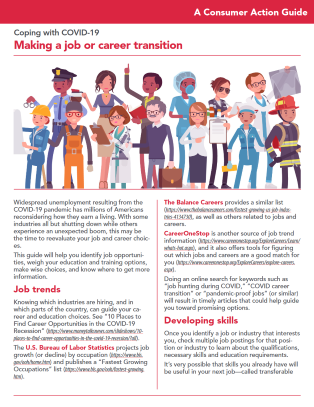Making a job or career transition
Coping with COVID-19
The coronavirus pandemic has put millions of Americans out of work, with many others reevaluating their job and career choices in light of how different industries are faring. This guide will help workers identify job opportunities, weigh their education and training options, make wise choices, and know where to get more information.

Publication Series
- This publication is part of the COVID-19 Educational Resources training module.
Download File
PDF files may contain outdated links.
Making a job or career transition
File Name: Jobs_COVID_2020_EN_v1.2.pdf
File Size: 0.56MB
Languages Available
Table of Contents
Widespread unemployment resulting from the COVID-19 pandemic has millions of Americans reconsidering how they earn a living. With some industries all but shutting down while others experience an unexpected boom, this may be the time to reevaluate your job and career choices.
This guide will help you identify job opportunities, weigh your education and training options, make wise choices, and know where to get more information.
Job trends
Knowing which industries are hiring, and in which parts of the country, can guide your career and education choices. See “10 Places to Find Career Opportunities in the COVID-19 Recession.”
The U.S. Bureau of Labor Statistics projects job growth (or decline) by occupation and publishes a “Fastest Growing Occupations” list.
The Balance Careers provides a similar list, as well as others related to jobs and careers.
CareerOneStop is another source of job trend information, and it also offers tools for figuring out which jobs and careers are a good match for you.
Doing an online search for keywords such as “job hunting during COVID,” “COVID career transition” or “pandemic-proof jobs” (or similar) will result in timely articles that could help guide you toward promising options.
Developing skills
Once you identify a job or industry that interests you, check multiple job postings for that position or industry to learn about the qualifications, necessary skills and education requirements.
It’s very possible that skills you already have will be useful in your next job—called transferable skills; then you can concentrate on developing just the additional skills needed. (Forbes’s “8 Job Skills To Succeed In A Post-Coronavirus World” can help you focus your efforts.)
Here are some free or low-cost ways to develop new skills:
Free/low-cost online classes: Depending on what you want to learn, there may be a free or low-cost standalone course you can take (as opposed to a course that is part of a certificate or degree program; see “Certificates and degrees,” below).
Find options in The Muse’s list of 14 sites. Find others by searching for the class or skill you’re seeking along with the words “free online classes” (or “low-cost” or “affordable”).
Check course reviews. One source of expert reviews, for both tech and non-tech courses, is PCMag.com; in the search bar, enter the name of the class provider and the word “review”—for example, “Codecademy review.”
And even if you’re not planning to start a business, there may be a free online class through the Small Business Development Centers (SBDCs) or the Small Business Administration (SBA) that could be useful in your next job (such as social media marketing or accounting).
Community college: These public schools offer general and skills-focused education as well as vocational and job training programs. They typically have open admission policies, charge low (or no) tuition, and offer night and weekend classes that make it easier for those who work full- or part-time to attend. Contact your local community college to see if it offers the education you want before you consider more expensive options.
Apprenticeships: On-the-job training allows you to prepare for a job or career while earning a paycheck. While the largest concentration of apprenticeships is in the construction and manufacturing trades—steel workers, electricians, solar panel installers, plumbers, etc.—there are opportunities in many fields.
If you’re good at math and logic/critical thinking, a new program, Apprenti, could lead you to a job in tech.
Veterans and those in the Guard or Reserve have on-the-job training and apprenticeship opportunities through the GI Bill; get more information at Military.com and Apprenticeship.gov.
Job training programs: These are offered by state and local governments, government agencies, nonprofits (Goodwill, for example), industries/employers, and other groups.
An American Job Center can help you find training opportunities in your area; call 877-US-2JOBS or search by ZIP code.
Find a list of the many job training programs and employment opportunities for veterans at USA.gov.
Volunteering: Certain types of volunteer work can help you develop or practice new skills. (A side benefit is that you could make new contacts that lead to a new job.) Check out websites that help you find the right volunteer opportunity.
Certificates and degrees
While a bachelor’s degree from a traditional four-year college is required for some professions, an associate degree or a certificate sometimes can offer even better income potential if you choose a well-paying, in-demand field. Check the median pay and entry-level education requirements for various occupations before choosing a path.
An associate degree includes a mix of general education classes and career preparation. It typically takes the equivalent of two years of full-time enrollment to earn one. Associate degrees are available at community (or junior) colleges, career colleges, and some four-year colleges and universities.
Certificate programs offer career-oriented education, meaning that the classes you take are directly related to the job you are preparing for. Many, if not most, certificates can be earned in a year or less. Certificate programs are offered by career colleges (also known as trade schools, vocational colleges or technical colleges) and many community colleges.
Beware of expensive, for-profit career colleges and certificate programs, which often saddle you with unaffordable student loans, yet fail to deliver a recognized or respected certificate/degree that will help you get a job. Also beware of online schools that are subpar or outright scams. Before choosing a school or program, contact companies hiring for the type of job you want and verify that a certificate or degree from there would qualify you to be hired.
Visit the Department of Education’s (ED) College Scorecard and College Navigator to evaluate schools (cost, accreditation, graduation rates, student loan default rates, etc.). Use Georgetown University’s online tool to check return on investment (value of your education compared to cost) for 4,500 schools.
Make sure that any school you choose is accredited (meets certain standards). The accrediting agency should be recognized by either the Council for Higher Education Accreditation or the Department of Education. Employers typically only hire applicants with degrees or certificates from an accredited program, and students can use federal student aid only at schools accredited by agencies recognized by the ED.
If you need money for your education, pursue financial aid and other options (such as the GI Bill, for veterans) before borrowing. If you must take out a student loan, make it a federal (not private) one, and understand that you must repay it whether or not you graduate.
More resources
- The FTC offers tips and resources in “Dealing with Job Loss.” The agency also alerts consumers to job scams, including those that demand money up front for “training.”
- JobScan’s “Considering a Career Change” page provides some useful guidance. (There is a charge for some JobScan services, but others—and general info—are free.)
- The U.S. Department of Education’s Adult Basic Education program can help you develop basic skills, prepare for the high school equivalency (GED) test and learn English as a second language—for free.
- AARP offers tips and resources for seniors in “These Job Programs Can Help You Find Work During the Pandemic.” And the Department of Labor’s Senior Community Service Employment Program helps subsidize employment and training for low-income, unemployed seniors.
- North America’s Building Trades Unions (NABTU) sponsors apprenticeship-readiness programs in many states. Learn about NABTU’s free 120-hour Multi-Craft Core Curriculum (MC3) course in the program brochure (English / Spanish). Locate an MC3 training center.
- Helmets to Hardhats connects National Guard, Reserve, and retired or transitioning active-duty military servicemembers with skilled training for the construction industry.
Published / Reviewed Date
Published: September 03, 2020
Download File
Making a job or career transition
File Name: Jobs_COVID_2020_EN_v1.2.pdf
File Size: 0.56MB
Sponsors

Notes
This guide was created as part of Consumer Action’s COVID-19 Educational Project.
Find all project materials here: COVID-19 Educational Project
Filed Under
Copyright
© 2020 –2024 Consumer Action. Rights Reserved.



